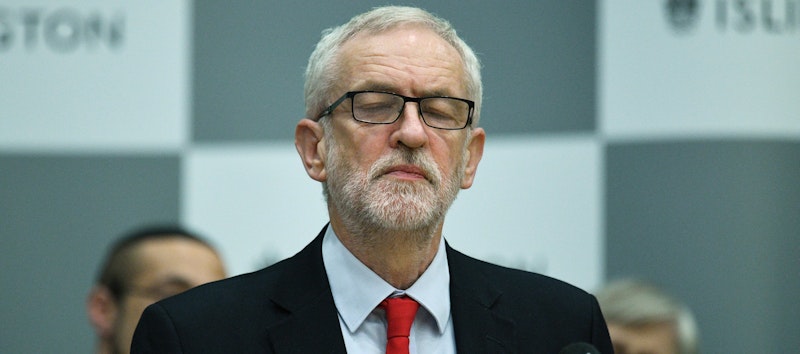Labour's devastating loss to the Tories in last week's British election has sparked a wave of admonishment, warnings, and recriminations, as such losses do. Centrists and opponents of the left have been quick to warn that socialist Jeremy Corbyn's defeat shows that the electorate hates radicalism and will crush it at the ballot box. People on the left have pointed to media bias, and right-wing bad faith weaponization of charges of anti-Semitism. Some have said that Corbyn should’ve embraced Leave; others that he should’ve embraced Remain. The Liberal Democrats have blamed Labour; Labour has blamed the Liberal Democrats. After such a massive defeat—Labour has fewer seats than at any time since 1935—there’s plenty of blame to go around.
I wish Labour had taken a stronger stand for Remain whether or not it would’ve helped them win. I’m disgusted by the way the right handled charges of anti-Semitism in the election, and not happy with the way the left handled them either. But if the left is to take one thing away from this fiasco, I hope it's that no one leader is, or can be, the movement.
Corbyn is a very appealing figure to many on the left. He has a long, principled history of championing workers, and his old-school Labour commitment to unions, wealth redistribution, and the social safety net is thoroughgoing and rare in Anglophone electoral politics. Many on the left, in both the UK and the US, were enthusiastically, and understandably, committed to his leadership. He seemed uniquely positioned to bring socialist change to the UK.
The problem was that outside of the most hardcore Labour supporters, Corbyn was shockingly unpopular in Britain. His approval rating floated at somewhere around 20-25 percent, and he was 40 points underwater at the time of the election. You can argue about how much of that was his fault and how much was the fault of an inimical media, or right-wing slanders. But the fact remains that he was more loathed even than the clownish and manifestly incompetent Boris Johnson.
It was always obvious that Corbyn would have trouble in a general election. His good showing in 2017 was surprising precisely because he's been so hated in general; otherwise, the surprise wouldn’t have been that Labour picked up ground, but that it could still come in behind a Conservative government as divisive and despised as Theresa May's Tories.
Yet many on the left treated any call for different leadership, or for that matter any criticism of Corbyn, as evidence of reactionary bad faith. Even post-election, enthusiasts have been reluctant to attach any blame to the Labour leader. I've seen some on social media saying that his crushing defeat proves that the left should abandon electoral politics, or that Labour has never been popular and Britain is too racist and conservative to ever vote left.
I understand the impulse to despair. Britain will almost certainly leave the EU, now; the chances of economic collapse, austerity, increased xenophobia, and disunion are high, and terrifying. For that matter, fascism is ascendant in many places across the globe, including the United States. A second Trump term, quite possibly enabled by open election tampering, is a real possibility.
But the many threats the left faces are all the more reason to be careful not to tie ourselves to any one leader, and not to take the failure of one leader as evidence of the failure of the movement as a whole. When we convince ourselves that a single person embodies all the hopes of leftism, we lose the ability to criticize them when they make poor decisions, or to move on to someone who offers better policies. We also lose the ability to strategically shift support to someone who has a better chance to win. And when you're trying to improve people's lives and defend them from racist or sexist violence and rapacious capitalism, winning is important.
This isn't to say that his supporters need to repudiate Corbyn, or spit on his legacy. He inspired many people, and at times seemed like he’d defeat the rabid xenophobic Tory rush towards Brexit and a smaller, meaner England. But in the UK or the US, the left needs to remember that critics aren't always enemies. No one person embodies the will of the people, or the hope of the left. As the Bernie Sander's slogan says, "Not me. Us."

